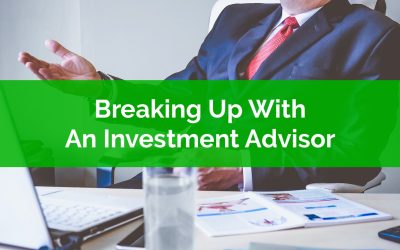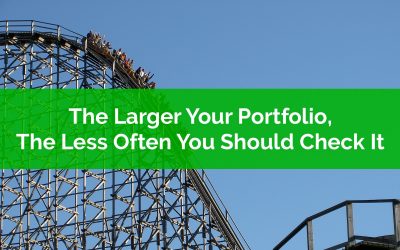Thank you for joining the waitlist!
You’re on the list for early access!
We will contact you via email when we’re ready for you to start your self-directed financial plan. In the mean time here is a quick preview…
Check out our latest blog posts…
Breaking Up With An Investment Advisor Is Hard To Do
Over the last few years the number of low-cost investment options has exploded in Canada. There are new and easy ways to create a low-cost diversified portfolio that isn’t dragged down by high investment fees.
There were always low-cost, do it yourself options, but they required a fair amount of manual work to make contributions, invest those contributions, and rebalance periodically (and let’s not forget, the stress of keeping yourself on course during a correction or recession).
But now there are new options available. In addition to a low-cost ETF portfolio or a low-cost mutual fund portfolio, there are options like low-cost “all-in-one” ETFs and low-cost robo-advisors.
These new options provide investors with new ways to invest in a low-cost portfolio without necessarily doing all the work themselves.
This has understandably put a lot of pressure on investment advisors who have historically charged extremely high fees on the investment products they sell.
The average investment fee on a mutual fund portfolio in Canada is around 2.3%. This can cause an enormous amount of drag on an investment portfolio. A $1,000,000 investment portfolio would experience a $23,000 annual drag from investment fees! That has a direct impact on how much retirement income you can create from your investment portfolio.
But switching from a high-priced mutual fund portfolio can be hard to do.
Even with the high fees, traditional investment options continue to dominate the investing landscape in Canada, but things are starting to change. For the first time ever, ETFs have outsold mutual funds. More money is flowing into ETFs than into mutual funds (bear in mind that you can also have high-priced ETFs, and low cost mutual funds, so this isn’t necessarily the best indicator).
But… if these low-cost investment options have been around for a while, why the slow change? Why aren’t more people switching?
There are three main risks people face when making a change of this kind, financial risk, emotional risk, and social risk. These risks can be difficult to overcome. Let’s understand each one and why they make breaking up with an investment advisor hard to do…
The Larger Your Portfolio The Less Often You Should Check It
When it comes to financial planning we often focus on the numbers, net worth, debt, rate of return etc. But half of financial planning has nothing to do with the numbers. Half of financial planning is about behavior. It’s about managing our behavior, our expectations, our emotions etc.
When it comes to personal finance, and specifically investing, we are often our own worst enemy. We make financial decisions based purely on emotion, often costing us more money down the road.
One of the most common mistakes we make is checking our investment portfolio too often. Investment portfolios are not something that should be checked daily or weekly (unless you’re day trading, which is a whole other conversation)
Checking our investment portfolios has become even easier with online brokerage accounts and financial aggregator apps like Mint.
But… just because it’s possible doesn’t mean you should.
The problem with checking your portfolio too often is that we don’t feel gains the same way we feel losses, even if they’re worth the exact same amount.
The emotional impact of a $10,000 loss is more than the emotional benefit from a $10,000 gain. It’s completely illogical, but that’s how we feel. We experience the emotional impact of losses more than gains. We remember losses more vividly, and for a longer period of time than we do for gains.
This is a problem when it comes to investing. Even though a well-diversified portfolio should gain over the long-term, it will likely experience some big swings in the short and medium-term. By checking our portfolios too often we experienced all those gains and losses, and because we feel losses more than gains, the net effect is that we can feel a bit sad.
What we need to do is check our portfolio less often, especially for medium and large portfolios. Let me explain why…
How To Pay Off The Mortgage Early
One of the largest purchases we’ll ever make is when we buy a home. It’s an exciting time but also very stressful. Along with this large purchase comes an equally large mortgage. This new debt will typically take between 25 and 30 years to pay off, but many people choose to pay off their mortgage earlier.
Paying off the mortgage early is an important financial goal. It’s a goal that typically (and hopefully) is achievable before retirement.
Paying off the mortgage early is a great medium-term goal, something achievable within 10-20 years (or even earlier if you’re really aggressive). This makes it a very interesting financial goal to include in your financial plan. Unlike investing, paying off debt is very predictable, so it can be very motivating to see steady progress against your mortgage each year.
Getting rid of your mortgage is a great feeling! It’s incredibly satisfying to see those mortgage payments disappear forever. It’s also nice to know that you have the security of owning your home outright.
Paying off the mortgage early also removes a large burden from your monthly cash flow. This creates a lot of flexibility to make lifestyle changes, switch careers, take more time off work, or even retire early.
There are different ways to pay off a mortgage early. Which method you choose will depend on your personal and financial goals. The important thing is to make a plan.
Making a mortgage payoff plan can be exciting. It’s amazing to see how those future payments can quickly reduce your mortgage. Making a plan is easy and we’ll show you a couple of examples using our free debt payoff tool. It’s always important to balance paying off the mortgage early against other financial goals, like saving for retirement. So make sure your goal to pay off the mortgage early is part of your overall financial plan.



